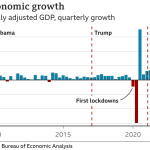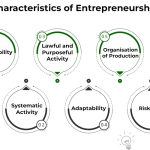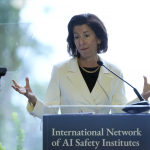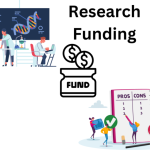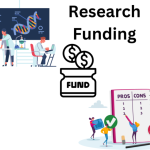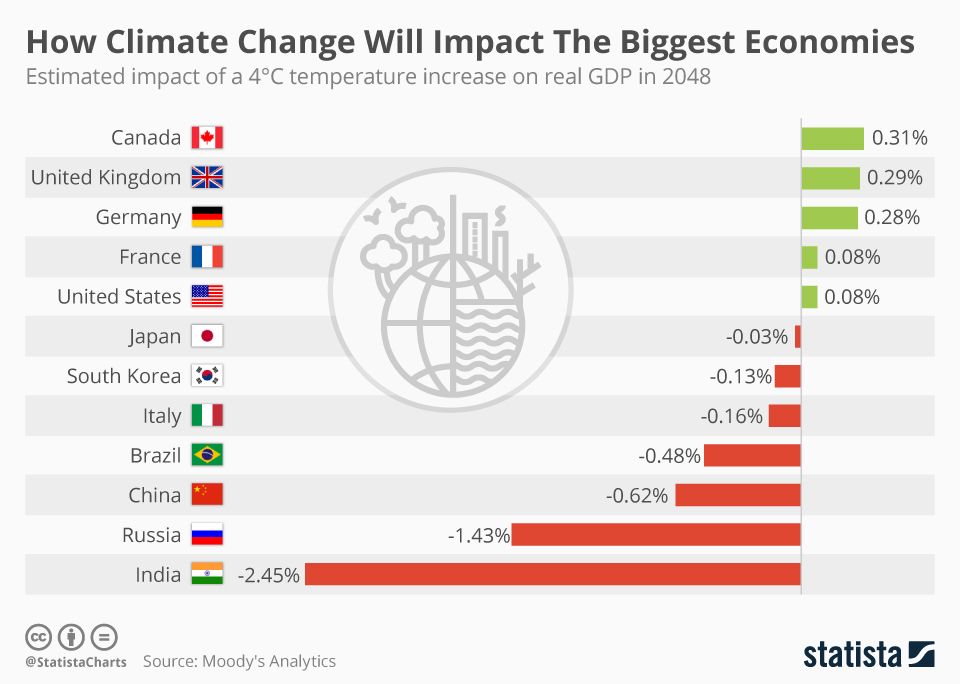The economic impact of climate change is a pressing issue that cannot be overlooked in today’s global discourse. Recent studies indicate that the projections of economic toll from climate change are alarmingly higher than previously reported, with potential GDP losses reaching unprecedented levels. As global temperatures rise, so do the stakes, threatening a 12 percent decline in global gross domestic product for every additional degree of warming. This stark reality raises critical questions about climate change economics and the validity of existing carbon modeling methods in predicting future losses. Addressing these challenges is vital, not only for safeguarding our economies but also for maximizing the decarbonization benefits that can mitigate these effects.
Economic repercussions resulting from shifts in climate patterns represent a crucial area of concern in environmental studies. The financial strain on global markets due to rising temperatures could lead to significant fiscal deficits, as experts predict substantive reductions in productivity and spending. By evaluating the projected threats posed by climate phenomena, such discussions encompass a need for innovative approaches, such as cost of carbon modeling and reformed policies aimed at reducing greenhouse gas emissions. The interplay between these environmental changes and economic stability underscores the importance of integrating climate considerations into economic planning processes. Indeed, navigating the intricate relationship between global temperature fluctuations and economic resilience will be key to mitigating long-term damages.
Understanding the Economic Impact of Climate Change
The economic impact of climate change is projected to be catastrophic, with the recent study by Bilal and Känzig highlighting that each 1°C rise in global temperatures could result in a staggering 12 percent reduction in global GDP. This estimate starkly contrasts previous forecasts that downplayed the economic risks associated with climate change. As the Earth continues to warm, the repercussions are not merely environmental but manifest significantly in economic productivity and spending behaviors across nations.
With the existing global temperature already 1°C above pre-industrial levels, the time for action is critical. Macroeconomic models that previously predicted modest GDP declines are under scrutiny, given the new evidence linking temperature increases directly to GDP losses. As this study suggests, the implications of climate change extend beyond mere temperature rises; they include a broader range of severe economic consequences that need to be integrated into national and global economic policies.
Revising Climate Change Economics for Greater Accuracy
Recent research sheds light on the inadequacies of traditional climate change economics models, which have often underestimated the severity of economic impacts. The new model introduced by Bilal and Känzig utilizes global temperature as a central variable, aligning more closely with geoscience data. By integrating a century’s worth of weather and economic records, their findings challenge previous assertions, demonstrating that the economic toll of climate change is significantly greater than once believed. This refined approach is essential for formulating effective strategies that tackle economic disparities caused by climate-related events.
The demand for improved climate change economic models is not only timely but essential. By revising the methods through which economists project future impacts, we can better prepare for destructive weather patterns that accompany global temperature increases. This progress in modeling highlights the importance of incorporating accurate temperature forecasts and understanding local variances in weather conditions when assessing long-term economic viability and resilience.
The Social Cost of Carbon: Revisiting Values
In examining the social cost of carbon, new research indicates a staggering global figure of $1,056 per ton—far exceeding previous estimates. This dramatic adjustment prompts a reevaluation of the economic frameworks surrounding carbon emissions and decarbonization policies. Considering the substantial disparity between this figure and earlier evaluations, such as the $185 per ton approximation, it becomes crucial for policymakers to align with this higher valuation to ensure comprehensive and effective climate action.
The assessment of social costs should also factor in regional variances and the specific economic contexts of different nations. By accurately pricing carbon emissions, countries can leverage the economic benefits of decarbonization. Notably, the U.S.’s calculated social cost of $211 per ton highlights important contrast with the estimated cost of federal decarbonization initiatives—$95 per ton—emphasizing a critical need for alignment in climate policy frameworks and commitment to substantial reductions in carbon footprints.
Decarbonization Benefits: An Economic Perspective
Decarbonization presents not only an environmental imperative but also undeniable economic advantages. As highlighted by Bilal, the potential of achieving a wealthier economy by 2100—despite climate change—underscores the economic resilience possible through effective climate policies. The cost-benefit analyses related to decarbonization show that transitioning to a low-carbon economy can yield high returns, promoting sustained economic growth while mitigating the adverse effects of climate change.
The economic benefits of decarbonization extend beyond mere compliance with environmental standards; they contribute to broader economic stability and job creation. As nations invest in renewable energy, they pave the way for innovation and advancements in technology, driving productivity and economic revitalization even in the face of climate challenges. This perspective is crucial, as it bridges climate policies and economic resilience, presenting a robust case for immediate and sustained investment in decarbonization.
Extreme Weather and Economic Disruption: A Correlation
As the frequency and severity of extreme weather events increase with rising global temperatures, the economic implications are profound. Instances of flooding, droughts, and heatwaves have direct consequences on productivity, infrastructure, and overall economic health. Bilal and Känzig’s research indicates that we can no longer view extreme weather as isolated incidents; instead, they represent systemic risks that can lead to significant economic downturns and disruptions across various sectors.
Understanding the nexus between extreme weather and economic disruption is vital for effective policy-making. Each extreme weather event impacts agricultural yields, destroys physical capital, and affects supply chains, which in turn disrupts GDP growth. By proactively addressing these challenges through strategic climate policies, we can not only safeguard economic stability but also build resilient structures to withstand future climatic shocks.
Global Temperature Rise and Its Economic Consequences
The implications of a global temperature rise are not merely theoretical; they present tangible economic risks that demand immediate attention. Bilal’s findings indicate that a 2°C rise could lead to a staggering 50 percent decrease in global output by the end of the century. Such predictions emphasize the urgency for innovative climate policies that confront both the rising temperatures and their consequent economic fallout. With economies interconnected, localized climate impacts can ripple through global markets, amplifying the need for comprehensive, global strategies.
In response to the threats posed by climate change, the global community must prioritize adaptation and mitigation strategies that minimize economic risks associated with temperature rises. By focusing on economic models that accurately reflect the costs of inaction, stakeholders can better allocate resources towards sustainable practices and technologies. This approach not only protects current economic performance but also fosters long-term growth in a changing climate.
Integrating Climate Change into National Economic Policies
Integrating climate change economics into national policy frameworks is essential for sustainable growth. Bilal and Känzig emphasize that the economic forecasts derived from their research require immediate adoption by policymakers. As global temperatures continue to rise, it becomes imperative that nations tether their economic strategies to climate realities, recognizing the deep interlinkages between climate policy and economic resilience.
When countries adopt inclusive economic models that account for the ramifications of climate change, they bolster their preparedness against potential economic shocks. Crafting policies that synergize climate action with economic objectives can lead to innovations that not only mitigate climate impacts but also enhance overall national productivity. This dual approach ensures that economic growth does not come at the expense of environmental sustainability.
The Role of Technology in Mitigating Economic Losses
Technological advancement plays a pivotal role in mitigating the economic losses associated with climate change. The integration of green technologies into various industries not only reduces emissions but also results in increased efficiency and productivity. Bilal highlighted how technological growth, while contributing to emissions, could also foster innovations in renewable energy that shield economies from the adverse effects of climate change.
By investing in and adopting cutting-edge technologies, economies can harness the potential for decarbonization while simultaneously boosting their GDP. This shift can lead to the emergence of new markets focused on sustainable practices, creating jobs, and stimulating economic activity. In essence, technology serves as a pivotal tool in navigating the complex relationship between climate change economics and economic performance.
Long-term Economic Planning in the Face of Climate Change
It is paramount to embed long-term economic planning within the context of climate change. Policymakers must prioritize forward-thinking approaches that consider the economic implications of climate shifts and incorporate them into developmental strategies. Bilal and Känzig’s research serves as a wake-up call to recognize that the economic strategies of today will significantly influence the resilience of economies in years to come.
Effective long-term planning involves forecasting future climate scenarios and assessing their potential economic impacts. By doing so, countries can allocate resources wisely and implement mitigation strategies that resist the negative effects of climate fluctuations. Attention to long-term climate economics not only provides a roadmap for sustainability but also secures the economic well-being of future generations.
Frequently Asked Questions
What is the economic impact of climate change on global GDP?
The economic impact of climate change on global GDP is profound, with estimates suggesting that every additional 1°C increase in temperature could lead to a 12% reduction in global GDP. This alarming projection far exceeds previous estimates, indicating that as global temperatures rise, economic losses will escalate significantly.
How does climate change economics affect local economies?
Climate change economics affects local economies through increased extreme weather events that disrupt productivity and damage infrastructure. As temperatures rise, the frequency and severity of these events increase, leading to substantial economic costs, including reduced output and heightened repair costs for assets.
What are the costs associated with carbon modeling in the context of climate change?
The costs associated with carbon modeling in the context of climate change include the social cost of carbon, which quantifies the economic harm from carbon emissions. Recent studies have estimated a social cost of $1,056 per ton globally, contrasting sharply with previous lower estimates, emphasizing the need for accurate modeling in climate finance and policy.
What are the decarbonization benefits in reducing economic losses from climate change?
Decarbonization benefits include mitigating the economic losses projected from climate change. Studies indicate that effective decarbonization can reduce the social cost of carbon and ultimately result in net economic gains, especially for major economies, as they adopt green technologies and sustainable practices, promoting growth while tackling climate impacts.
How does global temperature rise correlate with economic productivity?
Global temperature rise correlates negatively with economic productivity. For example, each 1°C increase in temperature has been shown to correlate with a 12% drop in global GDP, reinforcing the urgent need to address climate change in economic policies to prevent long-term stagnation and losses in productivity.
| Key Findings | Details | |
|---|---|---|
| Economic Toll of Climate Change | Projections of economic losses from climate change are now six times larger than previous estimates. | |
| Temperature and GDP Impact | Each additional 1°C increase in global temperature results in a 12% decline in global GDP. | |
| Comparison to Historical Events | A 2°C increase is projected to cut output and consumption by 50%, twice as severe as the Great Depression but ongoing indefinitely. | |
| Social Cost of Carbon | The recalibrated social cost of carbon is $1,056 per ton, much higher than previous models which pegged it at $185 per ton. | |
| Decarbonization Policy Insights | The results suggest that decarbonization strategies are economically viable for major economies. | |
Summary
The economic impact of climate change is profound and alarming, as new studies reveal forecasts that are significantly more severe than previous assessments. This escalating economic toll highlights the urgent need for robust climate policies and decarbonization strategies to mitigate these risks. Increased temperatures lead to dramatic reductions in GDP, emphasizing that the longer we delay action, the more we jeopardize economic stability and growth.

